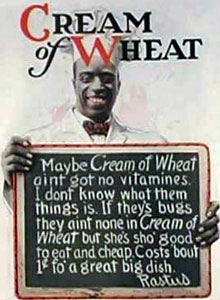Jim Crow Museum
1010 Campus Drive
Big Rapids, MI 49307
[email protected]
(231) 591-5873
Was the Black chef on Cream of Wheat boxes a real person? I believe he lived in Leslie, Michigan.
-- Jenni Barkowski, Cadillac, Michigan

A cultural icon may lie in an unmarked grave in Leslie. He is Frank White, a chef who claimed to sell Cream of Wheat to generations of Americans. White's story, like his grave, would be forgotten if not for the Mid Michigan Genealogical Society and family researcher Jesse Lasorda of Lansing. Cataloguing Leslie's Woodlawn Cemetery, the society found records of an unmarked "colored" grave. Lasorda was asked to learn more about the man buried there, Frank White.
Lasorda found proof White was born about 1867 in Barbados, came to the United States in 1875 and became a naturalized citizen in 1890. When he died February 15, 1938, White was described by the Leslie Local-Republican as a "famous chef" who "posed for an advertisement of a well-known breakfast food." Through his research, Lasorda became convinced White was the model for "Rastus," the smiling Cream of Wheat chef. "He was on the Cream of Wheat box from 1901 to 1925," Lasorda said.
If so, it is impossible to prove. Cream of Wheat company history says the chef was a real person photographed about 1900 while working in a Chicago restaurant. His image was the basis for future versions of Rastus, but no one bothered to record his name.
White was a well-traveled chef about the right age for the photo. He claimed to be the Cream of Wheat model and neighbors believed him.
Even if they had the same face, White and Rastus were different people. Rastus was sometimes used to sell cereal in ways racially offensive by today's standards. White's life was richer than a stereotype. He worked in cities, on trains and on steam ships. Married twice, White had no children. His first wife was said to be the second black woman to graduate from the University of Michigan. He settled in Leslie, her hometown, in the early 1920s. "After the (First) World War, he ran the Holly House in Mason and became noted in the vicinity for his "Maryland chicken," White's obituary said. "He seemed quite content to settle down to a peaceful life during the last days. He made many friends in Leslie and enjoyed caring for his chickens and pigs and working in his garden." White left an estate worth $400, Lasorda said.
"My No. 1 objective at this time is to do what I can to get this man a headstone," Lasorda said. "I am hoping someone will start a fund. Everyone should have a headstone." It seems the least we can do for an icon.
Article written by Brad Flory
Originally published September 9, 2004
Jackson Citizen Patriot 2004
All rights Reserved. Reprinted with permission.